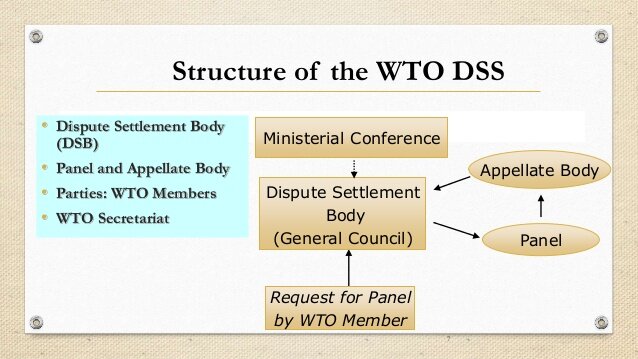Ahmedabad
(Head Office)Address : 506, 3rd EYE THREE (III), Opp. Induben Khakhrawala, Girish Cold Drink Cross Road, CG Road, Navrangpura, Ahmedabad, 380009.
Mobile : 8469231587 / 9586028957
Telephone : 079-40098991
E-mail: dics.upsc@gmail.com

WTO Dispute Settlement Mechanism
News: The 164-member WTO is gearing up for the 13th ministerial conference in Abu Dhabi, with emphasis on resolving diverse issues, including disputes settlement mechanisms and agricultural matters.
What is WTO Dispute Settlement system?
• The World Trade Organization (WTO) Dispute Settlement System is a key mechanism for resolving trade disputes among member countries.
• It operates under the Dispute Settlement Understanding (DSU), a legal framework that provides the rules and procedures for dispute resolution
• Its important components include:
o Dispute Panels: Panels are formed to examine complaints and make initial rulings.
o Appellate Body: Acts as an appeals tribunal, reviewing panel decisions.
o Dispute Settlement Body (DSB): Monitors the implementation of rulings and recommendations.
How does complaint mechanism work?
• A member country files a complaint, triggering consultations between parties.
• If consultations fail, a panel is established, and its report is reviewed by the Appellate Body.
• The DSB adopts the final report, and the offending country is expected to bring its measures into compliance.
What are the challenges observed?
• The Appellate Body is crucial for the system, but since 2019, it has been paralyzed due to the blocking of appointments by the United States. It stops the resolution of disputes, affecting the overall functioning of the dispute settlement system.
• Dispute resolution often takes longer than expected, impacting the timely resolution of trade issues. The lengthy process can reduce the effectiveness of the system and discourage compliance.
• Countries often interpret WTO agreements differently, leading to disputes over legal interpretations. It delays dispute resolution.
• The lack of a strong enforcement mechanism can undermine the credibility of the dispute settlement process.
• Developing countries often demand special and differential treatment, considering their economic and developmental needs. Balancing the demands for fairness while addressing concerns of all members poses a significant challenge.
What needs to be done?
• Endorse a resolution to appoint new members to the Appellate Body through a majority vote.
• Emphasize collaboration among developing countries, including the group of 17 least developed nations, to overcome the impasse.
• Acknowledge the potential risk of unilateral measures by the US in response to opposition to its veto.
• Advocate for swift corrective actions if a country is found in violation of WTO agreements. Propose a system of compensation or proportionate responses as remedies for continued non-compliance, ensuring accountability.
• Establish a framework for regular meetings between WTO members and the Appellate Body.
• Encourage nations to unite in finding common ground to address the crisis.

Address : 506, 3rd EYE THREE (III), Opp. Induben Khakhrawala, Girish Cold Drink Cross Road, CG Road, Navrangpura, Ahmedabad, 380009.
Mobile : 8469231587 / 9586028957
Telephone : 079-40098991
E-mail: dics.upsc@gmail.com
Address: A-306, The Landmark, Urjanagar-1, Opp. Spicy Street, Kudasan – Por Road, Kudasan, Gandhinagar – 382421
Mobile : 9723832444 / 9723932444
E-mail: dics.gnagar@gmail.com
Address: 2nd Floor, 9 Shivali Society, L&T Circle, opp. Ratri Bazar, Karelibaugh, Vadodara, 390018
Mobile : 9725692037 / 9725692054
E-mail: dics.vadodara@gmail.com
Address: 403, Raj Victoria, Opp. Pal Walkway, Near Galaxy Circle, Pal, Surat-394510
Mobile : 8401031583 / 8401031587
E-mail: dics.surat@gmail.com
Address: 303,305 K 158 Complex Above Magson, Sindhubhavan Road Ahmedabad-380059
Mobile : 9974751177 / 8469231587
E-mail: dicssbr@gmail.com
Address: 57/17, 2nd Floor, Old Rajinder Nagar Market, Bada Bazaar Marg, Delhi-60
Mobile : 9104830862 / 9104830865
E-mail: dics.newdelhi@gmail.com